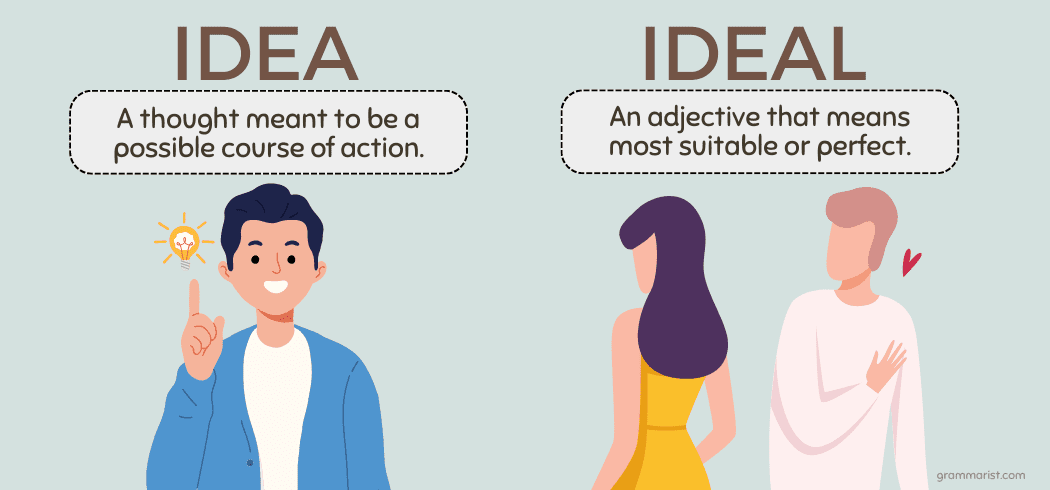ideals vs ideas definition 2025
Related Articles: ideals vs ideas definition 2025
- YouTube 2025: The Vision Of An Ideal Future
- Fast Food Ideas For Lunch 2025: Innovations Shaping The Future Of Quick Dining
- Best Business Ideas In Cambridge UK 2025: A Comprehensive Guide To Success
- Candy Bar Wrapper Ideas For 2025: A Sweet Treat For The Future
- Black And White Bathroom Ideas For Small Spaces In 2025
Introduction
In this auspicious occasion, we are delighted to delve into the intriguing topic related to ideals vs ideas definition 2025. Let’s weave interesting information and offer fresh perspectives to the readers.
Table of Content
Video about ideals vs ideas definition 2025
Ideals vs. Ideas: A Definition for 2025

Introduction
In the ever-evolving landscape of human thought and aspiration, it is imperative to revisit and redefine the fundamental concepts that shape our understanding of the world. Two such concepts, ideals and ideas, often intertwined but distinct, demand our renewed attention in the context of the rapidly approaching year 2025. This article aims to provide a comprehensive definition of ideals and ideas, exploring their similarities, differences, and their profound impact on human progress.
Defining Ideals
Ideals are principles or values that we hold as desirable and strive to attain. They represent our highest aspirations and guide our actions towards a better future. Ideals are often abstract and aspirational, serving as beacons of hope and inspiration. They transcend individual desires and encompass shared aspirations for a just, equitable, and harmonious society.
Examples of ideals include:
- Justice: The principle of fairness and equality for all.
- Freedom: The ability to think, act, and express oneself without undue constraints.
- Compassion: The empathetic understanding and care for others.
- Sustainability: The preservation and protection of our environment for future generations.
Defining Ideas
Ideas, on the other hand, are mental representations or concepts that describe or explain something. They are the building blocks of human thought and innovation. Ideas can be concrete and specific, such as a scientific theory or a technological invention, or they can be more abstract and philosophical, such as an ethical principle or a social concept.
Examples of ideas include:
- The Theory of Relativity: Albert Einstein’s groundbreaking theory that revolutionized our understanding of space, time, and gravity.
- The Internet: A global network of computers that has transformed the way we communicate, access information, and conduct business.
- Democracy: A system of government in which all citizens have a voice in decision-making.
- Feminism: A movement that advocates for the equality of women in all spheres of life.
Similarities between Ideals and Ideas
Despite their distinct characteristics, ideals and ideas share several similarities:
- Both are mental constructs: Ideals and ideas exist in our minds as mental representations or concepts.
- Both can inspire action: Ideals motivate us to strive for a better future, while ideas provide the blueprints for innovation and change.
- Both are essential for human progress: Ideals provide the direction and purpose for our actions, while ideas fuel our creativity and problem-solving abilities.
Differences between Ideals and Ideas
While ideals and ideas are intertwined, they differ in several key aspects:
- Abstractness: Ideals are typically more abstract and aspirational, while ideas can be more concrete and specific.
- Attainability: Ideals are often difficult to achieve in their entirety, while ideas can be more readily implemented and realized.
- Scope: Ideals are often broad and encompass a wide range of aspirations, while ideas are typically more focused and specific.
- Subjectivity: Ideals are often subjective and vary across individuals and cultures, while ideas can be more objective and universally applicable.
Ideals vs. Ideas in the Context of 2025
As we approach the year 2025, the world is facing unprecedented challenges and opportunities. To navigate these complexities and create a more just, sustainable, and prosperous future, we must harness the power of both ideals and ideas.
Ideals for 2025
The following ideals should guide our actions and aspirations in the coming years:
- Sustainability: We must prioritize the preservation and protection of our planet for future generations.
- Equity: We must strive for a world where all people have equal opportunities and access to resources.
- Compassion: We must cultivate a culture of empathy and understanding, where the well-being of others is paramount.
- Innovation: We must embrace creativity and innovation to solve global challenges and create a better future for all.
Ideas for 2025
The following ideas can help us translate our ideals into tangible realities:
- Renewable energy: We must accelerate the transition to renewable energy sources to combat climate change.
- Universal education: We must ensure that every child has access to quality education, regardless of their background or location.
- Artificial intelligence: We must harness the potential of artificial intelligence to improve healthcare, enhance productivity, and address societal challenges.
- Global cooperation: We must strengthen international cooperation to address global issues such as poverty, conflict, and climate change.
Conclusion
Ideals and ideas are fundamental concepts that shape our understanding of the world and our aspirations for the future. By embracing the power of both, we can create a more just, sustainable, and prosperous world by 2025. Ideals provide the direction and purpose for our actions, while ideas fuel our creativity and problem-solving abilities. By aligning our ideals with actionable ideas, we can transform our aspirations into reality and create a better future for all.
![[IMGSRCTITLE2]](https://grammarist.com/wp-content/uploads/Grammarist-Featured-Image-V7-2023-01-03T214838.440.png)
![[IMGSRCTITLE3]](https://thecontentauthority.com/wp-content/uploads/2022/08/idea-vs-ideal.jpg)
![[IMGSRCTITLE4]](https://ewr9gftwh9h.exactdn.com/wp-content/uploads/2021/12/idea-vs-ideal.jpg?strip=allu0026lossy=1u0026w=2560u0026ssl=1)
![[IMGTITLE5]](https://images.surferseo.art/64c6d565-468b-4080-84e8-a8d3b2a41313.png)
![[IMGTITLE6]](https://www.difference.wiki/images/ideal-vs-ideas-43075.webp)
![[IMGTITLE7]](https://pediaa.com/wp-content/uploads/2021/12/Difference-Between-Ideas-and-Concepts-Comparison-Summary.jpg)
![[IMGTITLE8]](https://i.ytimg.com/vi/hXuRlo66bUg/maxresdefault.jpg)
![[IMGTITLE9]](https://cdn4.vectorstock.com/i/1000x1000/96/98/ideas-vs-opportunities-concept-with-businessman-vector-10969698.jpg)
Closure
Thus, we hope this article has provided valuable insights into ideals vs ideas definition 2025. We thank you for taking the time to read this article. See you in our next article!